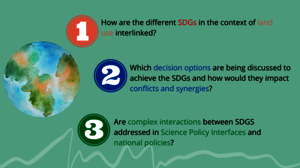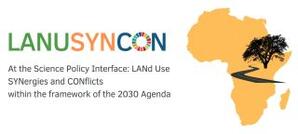At the Science Policy Interface: LANd Use SYNergies and CONflicts within the framework of the 2030 Agenda [LANUSYNCON]

The limited availability of natural resources, population growth and increasing consumption are presenting society with enormous challenges such as climate change, hunger, biodiversity loss, and land degradation. The demand for food, raw materials, energy, and housing has exceeded the availability of bio-productive area. This causes land use conflicts, loss of biodiversity, and land degradation. Besides, the insufficient coordination between land use decisions of different political sectors often leads to conflicts of land’s ownership, access and use. This is especially the case in sub-Saharan Africa, where the pressure on land is increasing.
The Sustainable Development Goals (SDGs) of the United Nations (UN) were adopted to overcome these challenges. In this context, LANUSYNCON not only examines the complex trade-offs between different Sustainable Development Goals (SDGs) but also translates knowledge from science into relevant policy options for policymakers. In particular, four SDGs that are highly relevant for political land use decisions are the following: Combating hunger through sustainable agriculture (SDG2), providing clean energy (SDG7), developing infrastructure (SDG9) and protecting biodiversity (SDG15). Additionally, several SDGs also contribute to Lanusyncon’s research focus, namely ending poverty (SDG1), ensuring good health and well-being (SDG3), taking urgent action combating climate change (SDG13), and strengthening partnerships for achieving the goals (SDG17). Without putting aside other goals, Lanusyncon also considers the trade-off and synergies of all SDGs in the process of research. Furthermore, we embrace gender perspectives in research and promote gender equality in our team.
LANUSYNCON assesses the role of Science Policy Interfaces (SPIs) in land use policies and the capacity of SPIs to consider synergies and conflicts in their work. The goal is to identify factors and obstacles to coherent land use in a development context and contribute to a better consideration of synergies and conflicts in political decisions.
Lanusyncon’s research project is divided into three work packages (WPs):
- WP1 assesses the effects of political decisions on different SDGs based on a dynamic Bayesian network and decision analysis
- WP2 is case studies in Sub-Saharan Africa, mainly in Kenya and Tanzania that provide insights and data for WP1 and WP3 at the local level. Furthermore, we conduct as well case studies in other countries such as Egypt and Sudan.
- WP3 investigates the role of national and international SPIs in these policy decisions, the extent to which land use conflicts and synergies are considered in the work of SPIs and which factors promote coherent land use policies.




